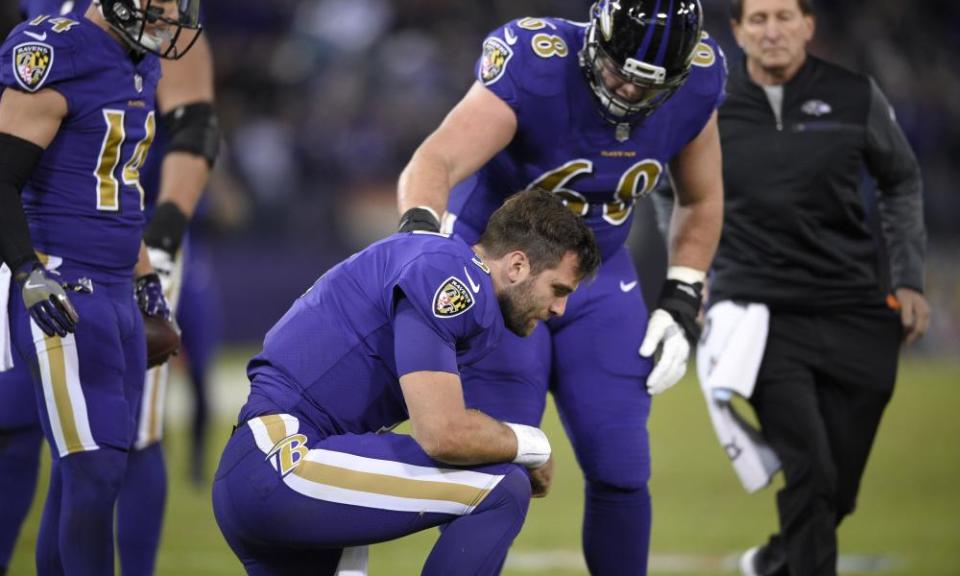NFL concussion: researchers hope blood tests can better detect head trauma
Several firms trying to develop new methods to assess extent of damage
Baltimore’s Joe Flacco left Miami game with concussion after heavy hit

In the second quarter of an NFL game on Thursday night, the Baltimore Ravens quarterback Joe Flacco slid to gain a first down. The 233lb Miami Dolphins linebacker Kiko Alonso flew into him, ploughing shoulder-first into his head.
Such was the force of the hit, Flacco’s helmet flew off. He walked from the field but he was dazed and bleeding from one ear. There was little doubt he had suffered a concussion.
It was an extreme example of the brutal reality of football. Many head injuries caused by the game, however, are harder to detect, the product of collisions repeated over time. Some researchers think a blood test may soon be one way of detecting such problems.
“At this point there are probably as many as 20 to 25 incredibly insightful biomarkers for brain health,” said Kevin Hrusovsky, chief executive of Quanterix, a startup that is one of a handful of companies seeking to develop standardized blood tests to detect concussions.
“We are hopeful we will be able to transform brain health in the way we’ve transformed cardiac health and even cancer health.”
Researchers at Quanterix and other companies hope blood tests will soon look for evidence of Alzheimer’s or dementia, much as standard cholesterol tests now help to assess heart problems.
“I think about [such tests] every minute of every day,” said Robert Stern, a researcher at Boston University who co-authored a landmark study that found the degenerative disease chronic traumatic encephalopathy (CTE) in the brains of 110 of 111 dead NFL players.
Since the 1920s, researchers have known that repeated blows to the head can result in cognitive degeneration. Recent research has shown how severe such damage can be. However, because CTE in particular can only be diagnosed after death, it is almost impossible to know how many people have it.
“There’s been tremendous advances over the last two years with regard to fluid biomarkers and Alzheimer’s disease,” said Stern. “We can then exploit what’s being done in that area for CTE.”
Blood tests for concussive injury could help manage neurodegenerative diseases, for example, answering with more certainty questions about how long an athlete should stay out of play; whether a person is predisposed for neurodegenerative disease; or whether disease is advancing. Stern and others hope the technology will eventually help ordinary people too, such as car accident victims.
There is still disagreement on how tests for concussion, and then neurodegeneration, might be applied. Stern sees a blood test as the first in a series of more specific panels, the way a breast cancer patient might first receive a mammogram, then a biopsy. Hrusovsky hopes degenerative diseases will be found in one blood test – hopefully, of course, one developed by his company.
Neurologists currently rely on a series of cognitive tests to see whether symptoms of traumatic brain injury are present. Perhaps that is why Quanterix’s work has caught the imagination of the public and the attention of the NFL. Through a partnership with General Electric, the league has given Quanterix $800,000 to continue the research, Bloomberg BusinessWeek reported.
“I did the math today,” said Pete Cronan, a former linebacker with Washington and the Seattle Seahawks, when asked about his concussions. “I’ve got six I can remember through my life.” The first was when he fell out of a bunk bed as a kid.
“But those are the ones that I can remember,” he said.
Researchers now consider blows that do not concuss but produce “altered states” to represent a cumulative danger.
“There were thousands of those in my life,” Cronan said.
According to the Baltimore Sun, Flacco’s injury was the first reported concussion of his 10-year, Super Bowl-winning career.
“We’re 30-plus years into studying these fluid-based biomarkers, and the data definitely supports that they can be used to correlate quite nicely with injury severity,” said Joshua Gaston, a researcher at the University of Texas Southwestern medical center who is also a football fan.
The work was now focused, he said, on making tests “reproducible, sensitive, specific”.

